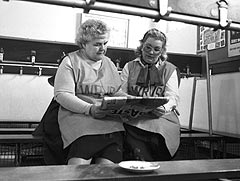Delivering in Partnership
In the early days of the NHS, nurses were in such short supply that patients who were able, took on some of their duties. It demonstrated a collective spirit and willingness to support the new service that has continued to the present day.
Today, it is estimated that many thousands of people in Scotland regularly volunteer in the health service providing invaluable practical and emotional support to patients. This can include a huge variety of different roles from counselling to hospital radio, patient transport to aromatherapy.
This is just one of the many partnerships that have been forged in the NHS. In truth, everything that the service achieves is through partnership working.
The most important partnership is with patients and carers. There have been complaints throughout the history of the NHS that patients, their families and the public have not been fully involved in some of the big decisions taken about their care. The development of Public Partnership Forums within Community Health Partnerships has helped to give local communities a greater influence over the design and delivery of services.
Another initiative announced by the Scottish Government in 2007 aims to use the views of patients, carers and staff to improve services. Better Together is a dedicated programme that will identify opportunities to redesign services, guided by what patients say is important.
The partnership with NHS staff is also of crucial importance. This is about more than being a good employer. It involves supporting staff in delivering change and developing new roles and new ways of working to improve services for patients.
There are important partnerships with other service providers such as local authorities which provide essential social care that links closely with health services.
Universities and further education colleges are other key partners. They provide the training that equips NHS staff with the skills they need, as well as carrying out research that can be used to improve services.
Last, but by no means least, are the many partnerships formed with voluntary organisations and charities across Scotland. The Women’s Royal Voluntary Service (WRVS), for example, has been working alongside the NHS since 1948 providing shops and tea bars along with a range of other services including hairdressing and flower arranging.
A more recent example of working with a charity to help patients has been the development of Maggie’s Centres across Scotland. These provide support and help for anyone with cancer in a relaxed and homely environment. The first opened in the grounds of the Western General Hospital in Edinburgh in 1996 and four others have been opened since in Glasgow, Dundee, Inverness and Kirkcaldy. All work closely with the local NHS cancer centre in supporting patients at this difficult time in their lives.
The NHS is achieving more for patients and their families through joint working with its many partners. This has been one of the abiding strengths of the NHS since 1948.
Hector MacKenzie
Head of Patient Focus and International Issues
- Further information
- Princess Royal Trust for Carers
- WRVS Scotland
- Volunteer Development Scotland

“Patients and carers are the real experts in what it feels like to receive care from NHSScotland. Our task is to listen to them and think afresh about ways in which we involve and engage them in shaping their care.”
Better Health, Better Care
Scottish Government 2007
“Volunteers have time and that can be a rare commodity. A high proportion of people coming through the hospital door have had bad news or are anxiously anticipating it, so a few cheerful words or a simple act of kindness can make a big difference to the day.”
Anne Boyd, WRVS Scotland
